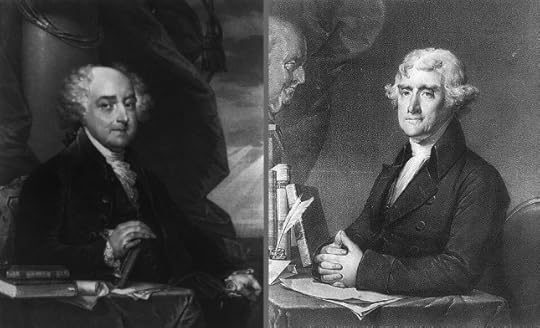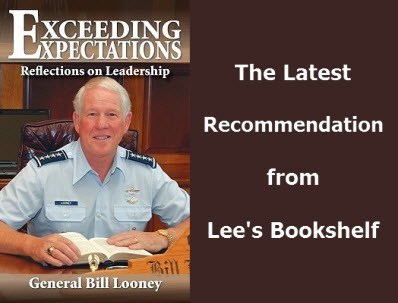Lee Ellis's Blog, page 339
February 5, 2014
C-Span Footage of Lee’s Keynote Speech on Leadership and Survival
In one his latest keynote speeches, Lee Ellis speaks to an audience of 1,000 about leadership and surviving the Vietnam War as a POW.
This particular speech is set in the context of understanding why the U.S. was involved in the Vietnam War and the freedoms that enjoy as Americans in peacefully protesting issues that we don’t agree with. Then, Lee answers some questions from the audience.
What lessons were learned during his experience? And, how can these lessons be adapted into everyday life and work? Click on the image below to watch (you will be taken to C-Span’s website), and please share your comments in this forum.
Want to skip to Lee’s Live Question and Answer Session during this speech? Watch it here.
 (Link to CSpan American History TV – click here)
(Link to CSpan American History TV – click here)
Related Articles:
The Paradox of Faith vs. Reality – How to Create Your Leadership Vision
Why Should a Leader Be Generous? What’s the Benefit? Read More…


February 4, 2014
Leadership and Teamwork: Record-Breaking 24-Mile Free Fall – Watch the Video
Who saw this amazing GoPro Super Bowl commercial showing Felix Baumgartner‘s 24-mile free fall from space? Below is the extended 8-minute version.
What you may not know is that Joe Kittinger Jr. (mentioned at the beginning and end of the clip) was a fellow Vietnam POW with Lee Ellis and others. Joe held the free fall record for many years and then helped Felix prepare, coaching him along the way.
This act and relationship between them speaks to vision, courage, and teamwork as well as the role of corporate capital to support new ventures that will benefit all mankind. Please share with us as we salute Felix and Joe!
Related Articles:
FAQ – “What is the main similarity between the battlefield and the corporate world?
Your Freedom in Leadership—Where Are You? New Checklist to Evaluate Personal Growth


February 3, 2014
The Disconnect Between Leading with Honor and Living with Honor
Do you see a disconnect in our society today between “leading with honor” and “living with honor”? For long-term, successful growth as an honorable leader in one’s work, we must first choose to live with honor in all daily, personal and professional decision-making.
Consider just a few recent headlines –
Air Force ICBM Testing – Cheating Issues
Pentagon Investigation – Military System Promotes Abusive Leaders
Pastor Ron Carpenter Mired in Martial Woes
Megachurch Pastor Abruptly Resigns Due to Infidelity
The mission, motive, and passion for Lee is teaching all leaders how live and lead with character, courage, as well as competency. If you would like to integrate Leading with Honor as part of your team training program, consider these options:
Schedule an upcoming leadership development training program in your organization using the new Leading with Honor Group Training Materials. Learn More
Contact Lee’s consulting company, Leadership Freedom LLC, to construct a customized training and/or coaching program. Learn More
We’re grateful for your desire to influence the growth of honorable leaders!


February 2, 2014
Adams and Jefferson Leadership Traits: Which One Was the Better Leader?

Pictured left to right: President John Adams and President Thomas Jefferson
By Lee Ellis
American presidents come and go throughout history, but think about the presidents that you regard as great leaders. Regardless of their political persuasion, do historically successful presidential leaders have common natural talents and traits?
Accomplishments Compared
More specifically, let’s compare presidents John Adams and Thomas Jefferson*. Both presidents were successful on many points. Here’s a brief look at their accomplishments –
John Adams
Massachusetts Delegate and Leading member of the Continental Congress
Leading advocate and signer of the Declaration of Independence
Author, Massachusetts Constitution
Diplomat to France
Negotiator and signor of the Paris Peace Accord ending the war with England
Minister to England
First U.S. Vice President
Second U.S. President
President of the Massachusetts Society of Arts and Sciences
Thomas Jefferson
Delegate to the Virginia House of Burgesses and the Continental Congress
Author of the Declaration of Independence
Governor of Virginia
Diplomat to France and delegate to the Paris Peace Talks with Adams
U.S. Secretary of State
U.S. Vice-President
U.S. President (2 Terms)
Founder of the University of Virginia
Godfather of John Quincy Adams
“Interesting Fact – Adams and Jefferson died on the same day, July 4th, 1826. Adams was 90 years old, and Jefferson was 83 years old.”
The Inevitable Comparison
For most of us in society, we tend to have a list of requirements in our minds about the traits of great leaders. Some of them would be –
Strong
Charismatic
Decisive
Bold
Fearless
Intelligent
Delegator
Great Communicator
Then, we translate those same traits into our everyday lives and assume that we must have those same traits to be an effective leader; and if you don’t have those traits, then being a leader isn’t your destiny. Nothing could be further from the truth—we’re all leaders whether we realize it or not.
“We’re all leaders whether we realize it or not.”
While Adams and Jefferson each had similar noted achievements, they had very different leadership styles. Through their own personality struggles and challenges, they still found a way to achieve greatness as leaders.
Significant Leadership Trait Differences
In David McCullough’s book, John Adams, he takes an interesting, deeper look at the natural and learned traits of these leaders. Take a look at these behavioral traits and note the remarkable difference between them** –
John Adams
Take Charge Personality
Assertive, self-assured, got results
Intolerant of indifference
Outgoing
A talker and entertainer
Passionate and good sense of humor
Fast-Paced
Controlling, Never learned to flatter
Cranky, impulsive, tactless
Spontaneous
Struggled with bringing order to his life
Had difficulty staying focused on one thing at a time
Thomas Jefferson
Cooperative
Subtle, soft-spoken
Moved slowly, cautious
Reserved
Remote, little sense of humor
Rarely revealed his inner feelings
Patient
Gracious, rarely disagreed with anyone publicly
Avoided dispute and confrontation
Planned
Always polite, diplomatic
Neat, kept letter perfect records, detailed
Obviously, both leaders had their own unique set of strengths and struggles, but they worked within their traits to emerge as accomplished individuals in their own regard.
So, What’s the Point?
Where your leadership is concerned, it’s important to remember the following -
Know your strengths and struggles, and manage them well.
Lead from a place of humble yet confident authenticity.
Balance your leadership by bringing others around you with different talent and traits.
As we remember and honor our nation’s leaders on Presidents Day this month, think about the president that relates closely to your own leadership style and be encouraged to fulfill your own leadership role in society. Please share your comments in this forum.
LE
*More information about the Adams and Jefferson comparison is featured in the Leading with Honor Group Training program. To learn more, go to FreedomStarMedia.com/Training.
**Traits described in the book “John Adams” by David McCullough, © 2001 Simon & Schuster, New York
Related Articles:
Two Successful U.S. Presidents—One Common Leadership Challenge
5 Steps to Help Obama (or Any Leader) Regain Leadership Confidence


January 29, 2014
2014 List – Top Thought Leaders in Trustworthy Business
See if some of your favorites made the list on the 4th Annual “Top Thought Leaders in Trustworthy Business”, published by Trust Across America.
Many of the honorees are well-known CEOs and leadership experts, while others are quietly working behind the scenes as teachers and researchers. What are some of your favorite trustworthy leaders?
Click here to read the list.


January 28, 2014
What’s the topic of your next leadership development training at work? Are you stuck?
What’s the topic of your next leadership development training at work? Are you stuck?
Consider Lee’s new Leading with Honor Group Training just released this month. Leaders that have used Leading with Honor say that their teams have better retention and use of the stories and leadership lessons in this training program.
Click to learn more. Also, please share other leadership training programs that you have studied in the past that you really enjoyed–we’d love to hear your input.


Leadership and BridgeGate – Who’s Doing the Right Thing?
Recently, Lee was a guest on My Fox 9 program, Chasing New Jersey, as they discussed recent issues related to Senator Chris Christie’s leadership.
Watch Lee’s reaction and commentary from a leadership development perspective, and share your thoughts on this topic. As we all look inward, what can we learn from this situation as leaders?
Click here or click the image below and watch on our Multimedia page.
Related Articles:
The Paradox of Faith vs. Reality – How to Create Your Leadership Vision
Leadership Psychology – Are Great Leaders Made or Born?


January 27, 2014
Why We Become Mindless Zombies at Work (and in Leadership)
Editor’s Note: We thought this article was an interesting spiritual perspective in regards to work and calling. You may or may not have the same spiritual beliefs, but it is our hope that you can gain some new perspective in this insightful article.
Original Article Link – Click Here
by Paul Sohn
If you add all the time spent at workplace, commuting to and from work and add in the time spent thinking about, preparing for, or conducting work-related activities in and outside of work, work consumes a significant amount of your life – about 30% by some estimates.
Now, here is what alarms me. Recent studies by Gallup report 13% of employees are happy at work worldwide (around 30% in U.S). In other words, globally, almost 9 out of 10 people dislike or hate their job.
Frankly speaking, I too have suffered from countless days feeling robbed from a sense of purpose, meaning, and joy from work. As a Christian, I have wrestled with the idea of viewing work as my God-given calling and living a life of excellence. Work felt at times like a cage where my potential was stifled, strength underutilized.
There are only a few things that are more painful than working in an environment that sucks out the joy in your life, becoming a mindless zombie at work.
But why don’t more of us experience joy at work? According to Susan Gibbons, the answer is two-fold.
First, false self promotes self hate. Brennan Manning in “A Glimpse of Jesus” describes false self as “the dominant malaise crippling Christian people and stifling their growth in the Holy Spirit.” All of us have grown up with cultural biases and parental pressures that constantly bombard us with messages like we’re not good enough, smart enough, or disciplined enough to acquire the virtues that would make us what we think we ought to be, torturing us spiritually and emotionally with “intense feelings of guilt, shame, remorse, and self-punishment.” The outcome becomes a pernicious one: a debilitating, unhealthy, and negative self-image.
The false self deceives us by living a life of constant comparison. Instead of looking within, we are looking outside. We have bought into the lie of finding joy in external matters such as wearing the latest fashion, getting the next promotion, buy that new car, or even on our spouse’s and children’s success.
The false self stands in complete opposition to the biblical idea of being made in the image of God as His workmanship. In Jeremiah 1:5, God says, “Before I formed you in the womb I knew you, before you were born I set you apart; I appointed you as a prophet to the nations.” It is a beautiful thing to know that we are known – known by our very Father, Creator, and Author in life.
As someone who wrestled with “inferiority complex” in my formative adolescence, I have experienced the devastating effect of this incorrect understanding of self in my life. Life becomes devoid of love, joy, and peace.
Second, Gibbons says that our workplaces are designed and populated by a host of false selves, looking for joy outside of themselves where it simply cannot be found. She says, “the workplace becomes a marketplace where the false self barter in values in order to manipulate structures, systems, and other people to produce outcomes that satisfy their intrinsic desire for personal development in pursuit of their highest human potential.
I love what she says next: The fundamental problem with that is, of course, that our highest human potential falls woefully short of God’s potential in our lives as lived out through the authentic self-growing and thriving in the new covenant love-relationship.
So as leaders, what can we do? Though we may not be able to directly give joy in our people, we can certainly help others find joy by creating a workplace that is conductive to growth in which people can find their God-given purpose through utilization of their God-given talents.
Question: How can leaders help others discover joy at work?
—


January 21, 2014
The Latest Recommendation from Lee’s Bookshelf – “Exceeding Expectations: Reflections on Leadership”
We wanted to mention the latest recommendation from Lee’s bookshelf – “Exceeding Expectations: Reflections on Leadership” by William R. Looney.
In this book, General Looney reflects upon his most formidable experiences during a 40-year career and articulates his leadership philosophy, which is built around a very simple notion — the greatest leaders are those who not only “exceed expectations,” but also inspire others to do the same.
Have you read this book? If so, please share. Read more about it on Good Reads.
Related Articles:
Lee’s Latest Book Recommendation – “Eyes on the Horizon” – Read Why













